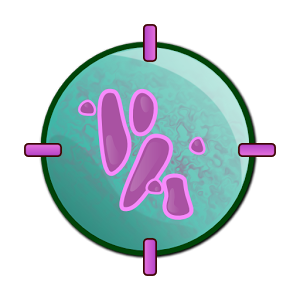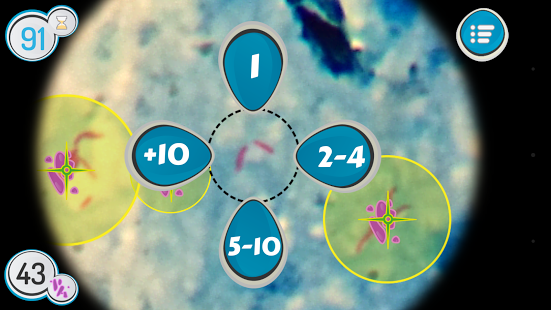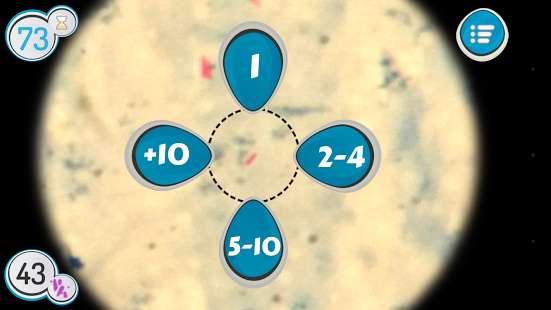Do you want to contribute to fight it? As a TuberSpot volunteer you can hunt "bacilli", bacteria that cause tuberculosis in images of medical samples. We will explain to you how to easily distinguish bacilli, which you wil have to "point and shoot". But beware, there are also "artifacts": they look like bacilli, but they are not! The better you do, the higher your score!
TuberSpot is a "serious game" developed by researchers at the Technical University of Madrid. We are researching how fast and accurate is the bacilli counting of non-expert microscopy players and how to combine the analysis of different players to obtain accurate results as good as the ones provided by expert microscopists. This concept was already tested with the previous game MalariaSpot. Results revealed that combining 22 games from nonexpert players achieved a malaria parasite counting accuracy higher than 99%. This performance could be obtained also by combining 13 games from players trained for 1 minute.
Tuberculosis (TB) is the greatest killer worldwide due to a single infectious agent. In 2013, 9 million people fell ill with TB and 1.5 million died from the disease. Over 95% of TB deaths occur in low- and middle-income countries. An estimated 37 million lives were saved through TB diagnosis and treatment between 2000 and 2013. However, the diagnosis of tuberculosis can be a time-consuming process, taking up to 20 minutes. The standard method is to inspect visually with a microscope a sputum sample (mucus that is coughed up). Technicians have to look for bacilli, bacteria causative of tuberculosis, and count them. But in the countries more affected by this disease there are not enough skilled specialists.
You can find more information about our project at www.tuberspot.org and social networks:
Twitter: @MalariaSpot
Facebook: facebook.com/malariaspot
TuberSpot is backed by the Support Unit for Innovation and the Clinical Microbiology Department of the San Carlos Hospital, the Center for Innovation in Technology for Human Development at UPM (itdUPM), the Center for Biomedical Research (CIBER-BBN ) of APOPO and Apps for Time. The project was partially funded by the Spanish Foundation for Science and Technology - Ministry of Economy and Competitiveness and Obra Social La Caixa, and Ashoka Foundation.
TuberSpot is a "serious game" developed by researchers at the Technical University of Madrid. We are researching how fast and accurate is the bacilli counting of non-expert microscopy players and how to combine the analysis of different players to obtain accurate results as good as the ones provided by expert microscopists. This concept was already tested with the previous game MalariaSpot. Results revealed that combining 22 games from nonexpert players achieved a malaria parasite counting accuracy higher than 99%. This performance could be obtained also by combining 13 games from players trained for 1 minute.
Tuberculosis (TB) is the greatest killer worldwide due to a single infectious agent. In 2013, 9 million people fell ill with TB and 1.5 million died from the disease. Over 95% of TB deaths occur in low- and middle-income countries. An estimated 37 million lives were saved through TB diagnosis and treatment between 2000 and 2013. However, the diagnosis of tuberculosis can be a time-consuming process, taking up to 20 minutes. The standard method is to inspect visually with a microscope a sputum sample (mucus that is coughed up). Technicians have to look for bacilli, bacteria causative of tuberculosis, and count them. But in the countries more affected by this disease there are not enough skilled specialists.
You can find more information about our project at www.tuberspot.org and social networks:
Twitter: @MalariaSpot
Facebook: facebook.com/malariaspot
TuberSpot is backed by the Support Unit for Innovation and the Clinical Microbiology Department of the San Carlos Hospital, the Center for Innovation in Technology for Human Development at UPM (itdUPM), the Center for Biomedical Research (CIBER-BBN ) of APOPO and Apps for Time. The project was partially funded by the Spanish Foundation for Science and Technology - Ministry of Economy and Competitiveness and Obra Social La Caixa, and Ashoka Foundation.














